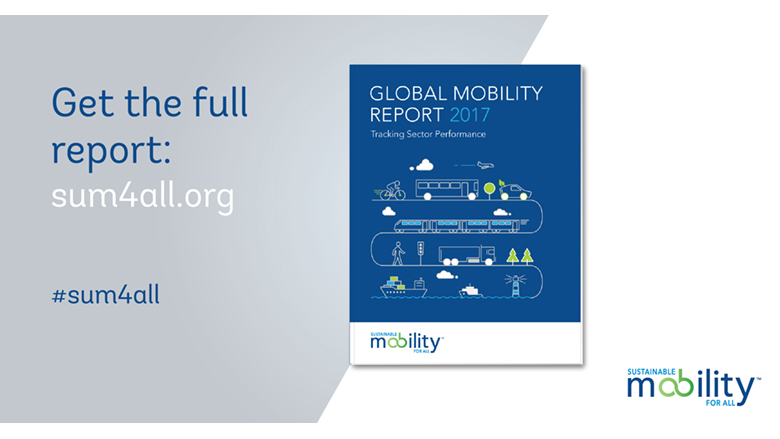Challenge
The transport sector has traditionally relied on issue-specific studies and assessments, and lacked a holistic analysis of how to advance towards sustainable mobility across its various dimensions and modes. The Global Mobility Report (GMR) is the first-ever attempt to examine the performance of the transport sector, globally, and its contribution to a sustainable future. It was developed around three components: (i) a definition of “sustainability mobility” (based on four policy goals, i.e., universal access, efficiency, safety and green mobility); (ii) targets for those goals, drawn from international transport agreements; and (iii) country-level indicators to measure progress towards those goals.
The GMR used data from 180 developed and developing countries, to measure and benchmark the performance against the foul goals of sustainable mobility and covered all modes of transportation, including road, air, water and rail.
Approach
The GMR was developed under the umbrella of the World Bank-led Sustainable Mobility for All global platform (SuM4All), in collaboration with other 55 influential public and private international organizations, from the United Kingdom and German Governments to UN-DESA, UNCTAD, ITF, Michelin, FIA, IsDB, CAF, UITP, ReCAP and WRI . SuM4All is one of the few partnerships within the World Bank with an initial mandate to provide Thought Leadership to fill a knowledge gap in the transport sector.
The World Bank and other bilateral donors provided funding to support SuM4All’s platform and the production of the GMR. A team of World Bank specialists and leaders worked closely with counterparts in other organizations to develop the product, provide critical advice and quality assurance. The GMR provided the much-needed data and evidence to inform the dialogue with countries on their mobility strategies and investment programs. This system-wide approach is a significant departure from the traditional, single-goal-at-a-time, view of transport. The report was developed through a broad consultative process, with input from transport stakeholders and 176 technical experts.
Results
The Global Mobility Report 2017 is the first-ever study to assess the global performance of the transport sector and the progress made toward four objectives of sustainable mobility: universal access, efficiency, safety, and green mobility. This report covered all modes of transport, including road, air, water, rail and non-motorized transport.
- The GMR established sustainable mobility and its four global goals as a useful, operational framework for policy action in transport, globally. It has become the trusted go-to resource on transport for many leaders around the world;
- Indicators used to measure sustainable mobility performances were used to track actual progress towards sustainable mobility in support of the 2030 Agenda using an interactive framework known as “Elementary Global Tracking Framework for Transport” (GTF);
- An accompanying series of knowledge “Connections” notes built on Global Mobility Report briefs covering topics such as safety, universal access for urban areas, efficiency, green mobility, achieving sustainable mobility, tracking sustainable mobility, framing sustainable mobility.
Bank Group Contribution
The World Bank provided financial support of 375,000.00 USD for the development of the report and has played the role of convener of external organizations. It also provided Thought Leadership and administrative support to the Global platform (via a World Bank-housed Secretariat for SuM4All), convened the partners and provided financial and overall secretariat support for the report.
Partners
A group of multi-stakeholder partners came together to produce this first edition of the Global Mobility Report using a jointly agreed-upon set of guidelines. The GMR is the first joint output of the World Bank and other 55 public and private organizations under the Sustainable Mobility for All umbrella. To mention few this include the United Kingdom German Governments UN-DESA, UNCTAD, ITF, Michelin, FIA, IsDB, CAF, UITP, ReCAP and WRI. No financial support was provided by partners rather than in-kind contribution to the production of the report.
Moving Forward
The Global Mobility Report 2017 addressed the “what” factors and established the imperative for urgent action on mobility around the world. A major follow-up activity, the Global Roadmap of Action toward Sustainable Mobility (GRA), was developed to complement the GMR and help countries operationalize their sustainable mobility programs and priorities. The GRA identifies the most relevant and impactful policy measures to achieve sustainable mobility, based on country’s performances. The GRA focused on addressing (i) How can countries and cities attain their Sustainable Development Goals (SDGs) and improve the sustainability of their transport sector? (ii) How can countries prioritize actions based on their performances on mobility and accelerate progress toward sustainable mobility? The GRA was launched October 23, 2019.
Both reports use actual and desirable indicators to form the basis of the “Elementary Global Tracking Framework for Transport (GTF)”. The GTF is updated frequently and helps track actual performance towards sustainable mobility in support of the 2030 Agenda. The GMR will be refined and updated as needed.
Beneficiaries
The GMR fills a knowledge gap that allows governments, international organizations, the private sector identify priorities and plan interventions that ultimately benefit the population in general, given transport’s fundamental economic and social role. In particular, poorer residents of developing countries are especially benefited because of the comparatively higher social and economic returns of sustainable mobility investments in relatively deprived settings. Leaders, governments, international organizations, transport stakeholders and experts around the world uses the GMR to assess countries performance toward sustainable mobility around the four policy goals of universal access, efficiency, safety and green mobility.
